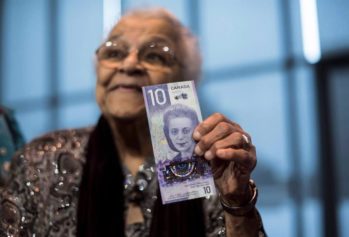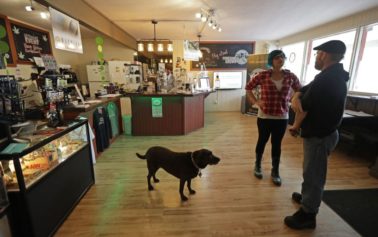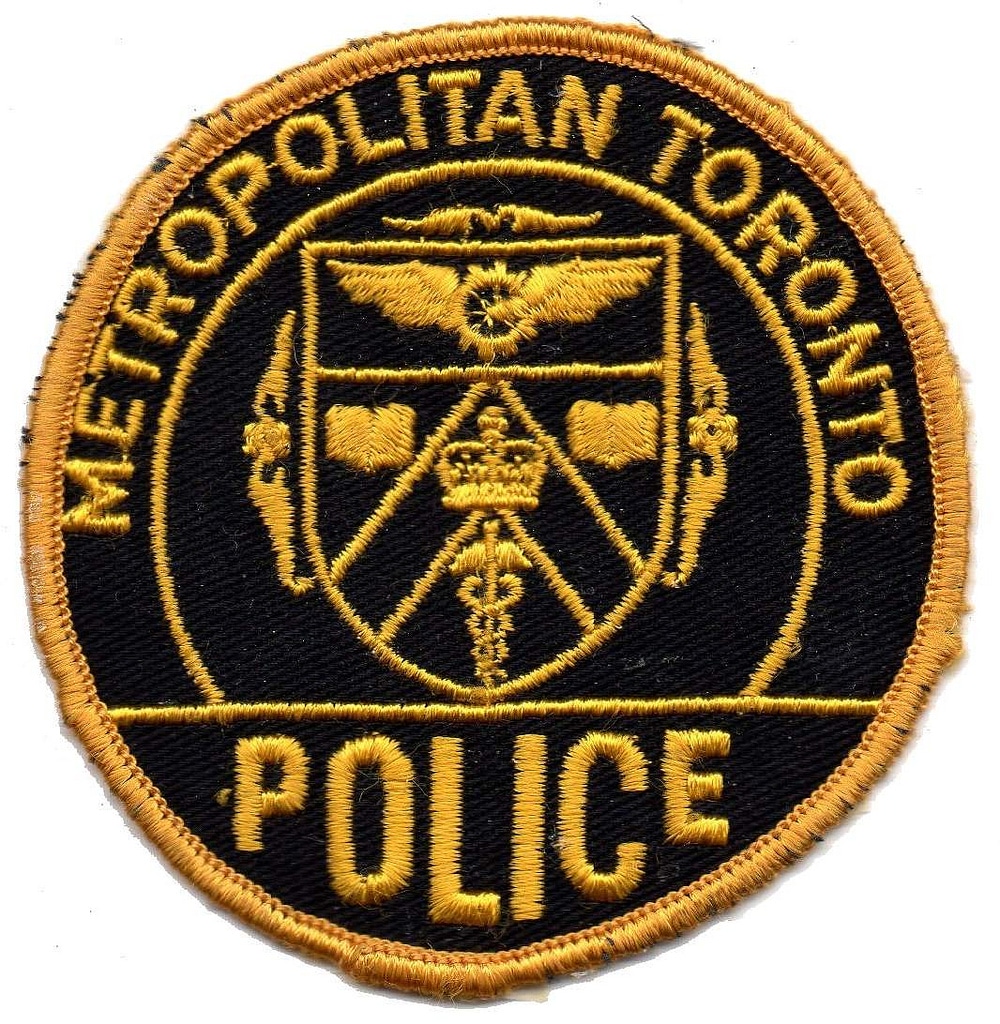
A new report from the Ontario Human Rights Commission, found that between 2013 and 2017, Black people in Toronto were 20 times more likely than whites to be fatally shot by the Toronto Police Service. (Photo: Flickr).
When Canadian Prime Minister Justin Trudeau told a woman heckler that “your racism has no place here,” it turns out he was wrong. The myth of Canada as a model of multiculturalism, in which racism is absent, has been shattered with the release of a report on Black people as the targets of police violence in Toronto, Canada’s largest city.
The report, issued by the Ontario Human Rights Commission using data from the Special Investigations Unit civilian police review organization, found that between 2013 and 2017, Black people in Toronto were 20 times more likely than their white counterparts to be fatally shot by the Toronto Police Service, or TPS. The commission spoke with 130 people in Toronto’s Black community in preparation for the report, and learned of the “fear, trauma, humiliation, mistrust and expectations of negative treatment” people have of the police, including the “collective impact” of police violence. Although Black people are 8.8 percent of Toronto’s population, they are involved in 28.8 percent of use-of-force cases, 36 percent of shootings, 61.5 percent of deadly encounters, and 70 percent of fatal shootings. Further, although Black men are a mere 4.1 percent of the Toronto population, they were one quarter of complainants alleging sexual assault by police.
“SIU Director’s Reports reveal a lack of legal basis for police stopping or detaining Black civilians in the first place; inappropriate or unjustified searches during encounters; and unnecessary charges or arrests,” the report said. “The information analyzed by the OHRC also raises broader concerns about officer misconduct, transparency and accountability. Courts and arms-length oversight bodies have found that TPS officers have sometimes provided biased and untrustworthy testimony, have inappropriately tried to stop the recording of incidents and/or have failed to cooperate with the SIU.”
Racism in Canada extends to the job market. According to a study from the Canadian Centre for Policy Alternatives, nonwhite women are at the greatest disadvantage in employment in the province of Ontario, earning only 58 cents for every dollar a white man earns. Nonwhite people are 29 percent of Ontario’s population.
Although racially-motivated acts are on the rise in Canada, a survey of 1,503 Canadians found that half of people believe racism is getting better and 43 percent think racism is worsening in their country, while 60 percent believe it is a growing problem in other nations.
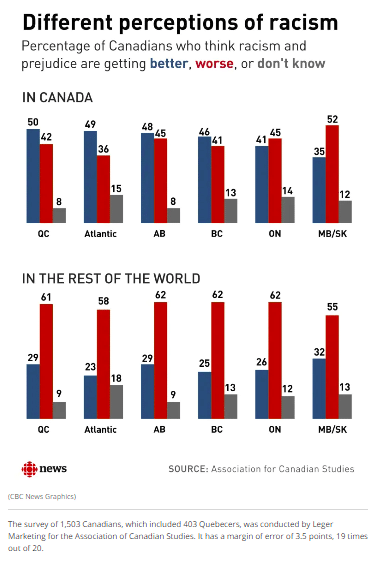
Other recent news reports point to an endemic problem of racism in Canada.
In Thunder Bay, Ontario, two reports — from the Ontario Civilian Police Commission and the Office of the Independent Police Review Director —condemned the local police oversight board and the police service for findings of systemic racism and a crisis of trust between the police and the Indigenous community. Law enforcement has faced accusations of racism and indifference in how it investigates deaths and disappearances of indigenous people. Thunder Bay is known for the highest homicide rate and hate crime rate in Canada, and deaths of nine high school students. Police have looked the other way in the face of an alarming rate of violence against indigenous people. Similarly, in Quebec, hundreds of indigenous people have come forward with stories of abuse, sexual abuse of women and misconduct while in police custody.
The Ontario Judicial Council ruled that Justice Donald McLeod, a Black judge, crossed the line yet did not engage in misconduct when he founded the Federation of Black Canadians —an anti-racism and anti-poverty advocacy group for Black people. McLeod has lobbied politicians, including the prime minister, and engaged in activism through the organization, which arose in the wake of the 2016 shooting death of a pregnant Black woman, to address the cycle of violence among Black Canadians.
In a number of universities across Canada, indigenous deans and faculty members have resigned from their posts over systemic racism and discrimination and efforts by the institutions to frustrate their anti-racism efforts.
Stacey Lee Kong, a Canadian who moved from Trinidad as a young child, commented in Canadian magazine Flare that racism is getting worse in Canada, and people are expressing their racial hatred more openly, yet somehow people believe they are better than their southern neighbors, or immune to the type of bigotry taking place in the U.S. Pointing to the rise in hate crimes and racial attacks on Black, Muslim and indigenous people, she noted that she fears for her safety and that of her loved ones because of a culture shift rather than isolated incidents in Canada. “Racist violence is on the rise in Canada, the U.S. and overseas. And even though some of these incidents are ‘just words,’ well, that’s still a precursor to racially-motivated violence, as we’ve seen in the aftermath of Trump’s election, both in the U.S. and here at home,” she wrote.
Student Brittany Garuk refers to racism in Canada as a type of “hidden racism” lying beneath “a veneer of normality.” Under these circumstances, people view only overt and raw forms of racism as a problem. The “unity in diversity” slogan of Canada’s multiculturalism erases race and racism, and fails to acknowledge the role of white supremacy and that society is not racially neutral. Issues of racial justice and equity are eschewed in favor of a focus on ethnic dance, music, food and clothing. “We need to stop asking if racism is a problem here, and talk about ‘why’ it is a problem here” she said, noting she created an awareness campaign to “show the overwhelming amount of pain caused by racism, here in Canada, pointing at the excuse that multiculturalism gives us not to worry about it.”
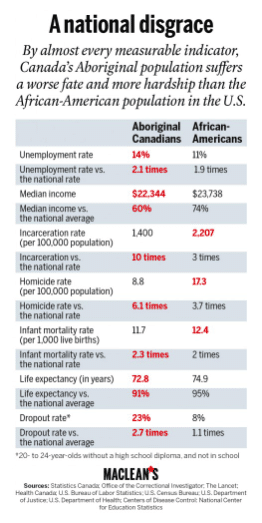
The Canadian Public Health Association has spoken out against racism in Canada, and has deemed it a pubic health issue. “Unfortunately Canada remains a nation where a person’s colour, religion, culture or ethnic origin are determinants of health that result in inequities in social inclusion, economic outcomes, personal health, and access to and quality of health and social services,” the association said in a statement, noting racism is insidious and impacts all aspects of life. “Those who experience racism exhibit poorer health outcomes including negative mental health outcomes, negative physical health outcomes, and negative health-related behaviours.” The organization cited the country’s egregious racist laws and policies, particularly as they relate to the violence, colonization, dislocation and genocide against indigenous peoples.
The Canadian Labour Congress, Canada’s largest organization, recently recognized Human Rights Day and the 70th anniversary of the Universal Declaration of Human Rights by standing up to racism, xenophobia and Islamophobia, and encouraging people to support the Charter for Inclusive Communities, which promotes “inclusive, just, and respectful communities in Canada.” The labor group cited the dramatic 47 percent rise in hate crimes in 2017 over the previous year, including a 50 percent rise in incidents against Black people, a 63 percent increase in hate crimes targeting the Jewish community, and a 151 percent rise in Islamophobic hate crimes.
The United Church of Canada and the United Church of Christ (USA) are participating in the UN International Decade for People of African Descent (2015–2024), which, among other things, is designed to implement measures to fight racism, xenophobia and intolerance, and implement measures for the full inclusion of people of African descent.
Canada is going through a reckoning with its racist legacy, including the removal of statues of racist historical figures, racist place names, the presence of the Ku Klux Klan in Western Canada, and racial segregation and civil rights struggles. The recently issued Canadian $10 bill bears the likeness of the Viola Desmond, the Black businesswoman and civil rights activist who, nine years before Rosa Parks, was arrested when she refused to get up from her seat in the whites-only section of a New Glasgow, Nova Scotia, movie theater.
In 2016, the United Nations Working Group of Experts on People of African Descent expressed “serious concerns” about systemic anti-Black racism in the Canadian criminal justice system. “There is clear evidence that racial profiling is endemic in the strategies and practices used by law enforcement,” said Ricardo Sunga, the head of the UN panel during its visit to Toronto, Halifax, and Montreal. “Arbitrary use of ‘carding’ or street checks disproportionately affects people of African descent.” After speaking with African-Canadians, the panel found that the nation’s history of enslavement, segregation and marginalization has had a harmful impact on people of African descent. However the Working Group welcomed the establishment of an Anti-Racism Directorate in Ontario to deal with systemic racism and promote just policies and practices.
The federal government is formulating a national anti-racism strategy, yet has faced criticism for holding their meetings closed to the public and by invitation only. To make matters worse, statements from Minister of Canadian Heritage and Multiculturalism Pablo Rodriguez— who said racism is not a part of his vocabulary and systemic racism is “not a part of his vocabulary” — suggest Canada will not pursue a serious study of racism in Canada.
Despite the image of Canada as a multicultural oasis, and the place where as many as 30,000 enslaved African refugees fled from the United States, it is clear that racism is a prominent issue that must be acknowledged if it is to be tackled.

